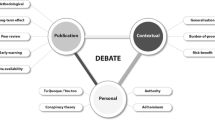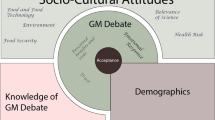Abstract.
Mandatory risk assessment is intended to reassure concerned citizens and introduce reason into the heated European controversies on genetically modified crops and food. The authors, examining a case of risk assessment of genetically modified oilseed rape, claim that the new European legislation on risk assessment does nothing of the sort and is not likely to present an escape from the international deadlock on the use of genetic modification in agriculture and food production. The new legislation is likely to stimulate the kind of emotive reactions it was intended to prevent. In risk assessment exercises, scientific uncertainty is turned into risk, expressed in facts and figures. Paradoxically, this conveys an impression of certainty, while value-disagreement and conflicts of interest remain hidden below the surface of factuality. Public dialogue and negotiation along these lines are rendered impossible. The only option left to critics is to resort to claims of fear and to call for new risk assessments to be performed, on and on again. Science is allowing itself to be abused by accepting the burden of proof in matters more suited to reflection and negotiation. The specific challenge to science would be to take care of itself – rethinking the role and the limitations of science in a social context, and, thereby gaining the strength to fulfill this role and to enter into dialogue with the rest of society. Scientific communities appear to be obvious candidates for prompting reflection and dialogue on this issue.
Similar content being viewed by others
Abbreviations
- DKK:
-
Danish Krone
- EU:
-
The European Union
- GMO:
-
Genetically Modified Organism
References
U. Beck (1986) Risikogesellschaft Auf dem Weg in eine andere Moderne. [Risk Society: Towards a New Modernity]. Suhrkamp Verlag Frankfurt a.M., Germany
A.-K. Bock K. Lheureux M. Libeau–Dulos H. Nilsagård E. Rodriguez–Cerezo (2002) Scenarios for Co-existence of Genetically Modified, Conventional and Organic Crops in European Agriculture European Commission, Joint Research Centre, IPTS Sevilla, Spain
InstitutionalAuthorNameESRC Global Environment Change Programme (1999) The Politics of GM Food. Science and Public Trust. Special Briefing No. 5. University of Sussex Risk
European Union (2002). Directive 2001/18/EC of the European Parliament and of the Council of 12 March 2001 on the Deliberate Release into the Environment of Genetically Modified Organisms and Repealing Council Directive 90/220/EEC. CONSLEG:2001L0018. Luxembourg: Office for Official Publications of the European Communities.
M. Gibbons (1999) ArticleTitle“Science’s new social contract with society” Nature 402 IssueID(Supplement C81–C84 Occurrence Handle1:CAS:528:DyaK1MXnslKmsbs%3D Occurrence Handle10591229
Gliddon, C. J. (1999). “Gene flow and risk assessment.” In BCPC Proceedings. No. 72, Gene Flow and Agriculture: Relevance for Transgenic Crops. BCPC Symposium, April 12–14, 1999 (pp. 49–56). University of Keele, UK: British Crop Protection Council.
L. Hall K. Topinka J. Huffman L. Davis A. Good (2000) ArticleTitle“Pollen flow between herbicide-resistant Brassica napus is the cause of multiple-resistant B. napus volunteers” Weed Science 48 IssueID6 688–694 Occurrence Handle1:CAS:528:DC%2BD3MXhsFyhu74%3D
L. B. Hansen H. R. Siegismund R. B. Jørgensen (2001) ArticleTitle“Introgression between oilseed rape (Brassica napus L.) and its weedy relative B. rapa L. in a natural population” Genetic Resources and Crop Evolution 48 IssueID6 621–627 Occurrence Handle10.1023/A:1013825816443
N. Holtug (2001) ArticleTitle“The harm principle and genetically modified food” Journal of Agricultural and Environmental Ethics 14 169–178 Occurrence Handle10.1023/A:1011392526611
N. Holtug (2002) ArticleTitle“The harm principle” Ethical Theory and Moral Practice 5 IssueID4 357–389 Occurrence Handle10.1023/A:1021328520077
S. Jasanoff B. Wynne (1998) “Science and decision-making” S. Rayner E. L. Malone (Eds) Human Choice and Climate Change: The Societal Framework Battelle Press Columbus, Ohio 1–87
J. Lassen K. H. Madsen P. Sandøe (2002) ArticleTitle“Ethics and genetic engineering – lessons to be learned from GM foods” Bioprocess and Biosystems Engineering 24 263–271 Occurrence Handle1:CAS:528:DC%2BD38XitFCrt7g%3D
B. Latour (1987) Science in Action. How to Follow Scientists and Engineers Through Society Harvard University Press Cambridge, Massachusetts
G. Meyer (2003) ArticleTitle“Scare Stories. Or some arguments for providing journalism with a licence to think” European Review 11 IssueID1 57–65 Occurrence Handle10.1017/S1062798703000073
Orson, J. (2002). Gene Stacking in Herbicide Tolerant Oilseed Rape: Lessons from the North American Experience. Peterborough, UK: English Nature Research Reports No. 443.
M. Pertl T. P. Hauser C. Damgaard R. B. Jørgensen (2002) ArticleTitle“Male fitness of oilseed rape Brassica napus, weedy B. rapa and their F1 hybrids in mixed populations” Heredity 89 212–218 Occurrence Handle1:CAS:528:DC%2BD38Xms1eqsL0%3D Occurrence Handle12209392
K. R. Popper (1959) The Logic of Scientific Discovery Basic Books New York
J. V. Rodricks (1992) Calculated Risks Understanding the Toxicity and Human Health Risks of Chemicals in Our Environment Cambridge University Press Cambridge, UK
Simpson E. C., C. E. Norris, J. R. Law, J. E. Thomas, and J. B. Sweet (1999). “Gene flow in genetically modified herbicide tolerant oilseed rape (Brassica napus) in the UK.” In BCPC Proceedings. No. 72, Gene Flow and Agriculture: Relevance for Transgenic Crops. BCPC Symposium, April 12–14, 1999 (pp. 75–81). University of Keele, UK: British Crop Protection Council.
B. Wynne (2001) ArticleTitle“Creating public alienation: Expert cultures of risk and ethics on GMOs” Science as Culture 10 445–481 Occurrence Handle10.1080/09505430120093586
Author information
Authors and Affiliations
Corresponding author
Rights and permissions
About this article
Cite this article
Meyer, G., Folker, A.P., Jørgensen, R.B. et al. The factualization of uncertainty: Risk, politics, and genetically modified crops – a case of rape. Agric Hum Values 22, 235–242 (2005). https://doi.org/10.1007/s10460-004-8283-z
Issue Date:
DOI: https://doi.org/10.1007/s10460-004-8283-z




